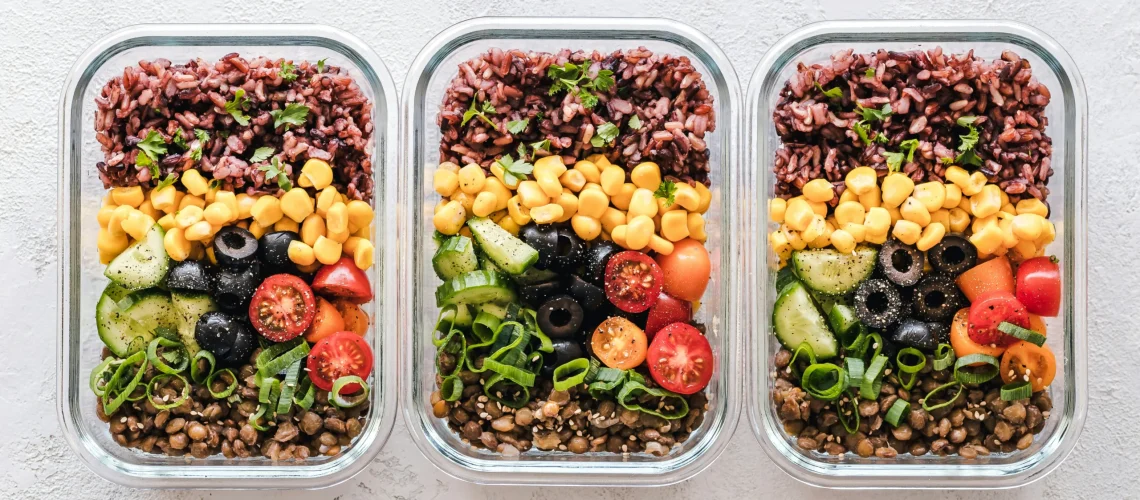In recent years, plant-based diets have grown in popularity. This trend is more than a dietary choice; it reflects a global shift towards sustainable living and wellness. While many are eager to get involved, some aren’t sure how to start.
To make your life easier, we’ve put together a step-by-step guide to transitioning to a plant-based diet. Whether you’re motivated by health benefits, environmental concerns, or ethical reasons, this guide is designed to support you through every stage of your plant-based journey, ensuring a smooth and enjoyable transition.
What is a Plant-Based Diet?
A plant-based diet centers around plant foods, including vegetables, fruits, grains, nuts, seeds, and legumes, while minimizing or eliminating animal products. This diet is not just about avoiding meat; it’s about embracing a rich diversity of plant-based foods that offer a spectrum of nutritional benefits.
‘Plant-based’ is often used interchangeably with ‘vegetarian’ and ‘vegan,’ but subtle differences exist. Vegetarians exclude meat and fish but may consume dairy and eggs. Vegans cut out all animal products, including dairy, eggs, and honey. Plant-based diets, however, focus more on the abundance of plant foods rather than just the exclusion of animal products.
Within the plant-based spectrum, there are variations like the flexitarian diet, which is predominantly plant-based but occasionally includes meat or fish, and the pescatarian diet, which includes fish but no other meat. These variations offer flexibility, catering to health needs, ethical considerations, and personal preferences.
Benefits of a Plant-Based Diet
The shift to a plant-based diet brings many benefits, from personal health to global environmental impact.
Health Benefits: One of the most compelling reasons to adopt a plant-based diet is its profound impact on health. Studies have consistently shown that such a diet can significantly improve heart health. It does so by lowering blood pressure, reducing cholesterol levels, and decreasing the risk of heart disease. Additionally, plant-based diets can help prevent and manage diabetes thanks to their high fiber content and low glycemic index. These diets are also beneficial for weight management. Plant-based foods are typically lower in calories and higher in nutrients, making them ideal for maintaining a healthy weight without sacrificing satiety or nutrition.
Environmental Impact: On an ecological level, plant-based diets are more sustainable and have a lower carbon footprint than diets high in animal products. Production of plant-based foods generally requires less water, land, and energy, resulting in lower greenhouse gas emissions. By choosing plant-based options, individuals contribute to reducing the strain on our planet’s resources, playing a part in combating climate change.
Ethical Considerations: From a moral standpoint, a plant-based diet aligns with principles of animal welfare. Individuals indirectly support the reduction of factory farming and the associated ethical concerns, including animal cruelty and inhumane living conditions, by reducing the demand for animal products.
Assessing Your Current Diet
Before transitioning to a plant-based diet, it’s crucial to understand your current eating habits. This assessment forms the foundation for a successful dietary shift.
Start by keeping a food diary for a week. Record everything you eat and drink, noting the time of day and portion sizes. This practice will help you identify patterns, such as reliance on certain food groups, snacking habits, and meal regularity. Pay attention to how often and how much meat, dairy, and processed foods appear in your diet.
Analyzing your current food intake provides valuable insights into your nutritional habits and helps you plan a balanced plant-based diet. It also allows you to set realistic goals and make incremental changes that are sustainable in the long term. Remember, the goal is to remove animal products and replace them with nutritious plant-based alternatives.
Gradual Transition vs. Immediate Overhaul
Now, the real question: Should you transition immediately or gradually? Both strategies have their merits and challenges.
Gradual Transition: This approach involves slowly incorporating more plant-based foods into your diet while reducing animal products. It’s less overwhelming and allows your palate and digestive system to adjust. Gradually transitioning can also make the change more sustainable in the long term, as it feels less like a drastic shift and more like a natural evolution of your eating habits. However, it may take longer to experience the full health benefits associated with a plant-based diet.
Immediate Overhaul: For those who prefer a swift change, an immediate switch can empower and instantly align your eating habits with your health or ethical goals. This approach can quickly bring about significant health benefits. However, it requires considerable planning and commitment and can be more challenging to sustain without a robust support system or deep personal motivation.
Personalized Approach: Ultimately, the choice between a gradual transition and an immediate overhaul should be based on individual lifestyle, health conditions, and personal preferences. Listening to your body and making adjustments that feel right for you is essential.
Essential Nutrients in a Plant-Based Diet
A well-planned plant-based diet can provide all the essential nutrients your body needs. However, it’s important to be mindful of certain nutrients commonly obtained from animal products.
Protein: Contrary to popular belief, many plant-based foods are protein-rich. Legumes (beans, lentils, chickpeas), tofu, tempeh, seitan, whole grains, nuts, and seeds are excellent sources.
Iron: Plant-based sources of iron include lentils, chickpeas, beans, tofu, cashews, chia seeds, ground linseed, hemp seeds, pumpkin seeds, kale, dried apricots, and fortified cereals. Iron from plant sources is absorbed better when consumed with vitamin C-rich foods.
Calcium: This nutrient is vital for bone health and can be found in fortified plant milks and juices, tofu made with calcium sulfate, and leafy green vegetables like kale and bok choy.
Vitamin B12: B12 is crucial for nerve function and is the only nutrient not naturally found in plants. It can be obtained from fortified foods (such as plant milk, soy products, and breakfast cereals) or supplements.
Omega-3 Fatty Acids: Essential for heart and brain health, omega-3s can be sourced from flaxseeds, chia seeds, hemp seeds, walnuts, and algae-based supplements.
Supplementation may be necessary in some cases, particularly for vitamin B12 and omega-3 fatty acids. It’s advisable to consult with a healthcare provider or a dietitian to ensure your plant-based diet meets all your nutritional needs.
Practical Tips for Transitioning
Transitioning to a plant-based diet can be a rewarding journey with the right strategies:
- Start with One Plant-Based Meal a Day: Replacing one daily meal with a plant-based option. This could be a breakfast of oatmeal with fruits and nuts, a lunch salad loaded with beans and veggies, or a hearty vegetable stir-fry for dinner. This gradual approach helps acclimate your taste buds and digestive system.
- Incorporating Plant-Based Alternatives and Meat Substitutes: Explore the variety of plant-based alternatives available, such as tofu, tempeh, seitan, and legume-based products. These can mimic the texture and flavor of meat, making the transition more accessible, especially for those used to meat-centric meals.
- Meal Planning and Preparation Strategies: Plan your meals for the week to ensure a balanced intake of nutrients. Batch cooking and prepping ingredients in advance can save time and reduce the temptation to revert to non-plant-based options. Keep your pantry stocked with whole grains, legumes, nuts, seeds, and spices to make meal preparation easier and more enjoyable.
- Dealing with Social Situations and Dining Out: Research plant-based options at restaurants in advance. When attending social events, consider bringing a plant-based dish to share. Communicate your dietary preferences clearly but respectfully, and don’t be afraid to ask for modifications when dining out.
Overcoming Challenges and Common Misconceptions
- Protein and Nutrient Concerns: A common misconception is that plant-based diets lack sufficient protein. However, many plant foods, such as beans, lentils, tofu, and quinoa, are rich in protein. To meet protein needs, ensure a variety of these in your diet.
- Handling Cravings and Old Eating Habits: Cravings for familiar foods can be managed by finding plant-based alternatives with similar tastes and textures. Be patient with yourself as your palate adjusts. Experiment with new recipes to keep meals exciting and satisfying.
- Staying Motivated and Dealing with Setbacks: Set realistic goals and celebrate small victories. Connect with a community of plant-based eaters for support and inspiration. If you experience setbacks, don’t be too hard on yourself. Reflect on the reasons behind your choice to go plant-based and use them as motivation to continue on your journey. Remember, transitioning to a plant-based diet is a process, and taking it one step at a time is okay.
Sample Meal Plan and Recipes
- Breakfast: Avocado toast on whole grain bread, topped with sliced tomatoes and a sprinkle of hemp seeds.
- Lunch: Quinoa salad with black beans, corn, bell peppers, cilantro, and a lime vinaigrette.
- Dinner: Stir-fried tofu with broccoli, carrots, and snap peas in a garlic ginger sauce, served over brown rice.
- Snacks: Hummus with carrot and cucumber sticks; a piece of fruit like an apple or a banana.
These meals are not only nutritious but also simple to prepare. They incorporate a variety of plant-based proteins, whole grains, and fresh vegetables, ensuring a balanced intake of essential nutrients.
Final Thoughts on Switching to a Plant-Based Diet
Embarking on a plant-based journey is a personal and gradual process, one that requires patience and experimentation. Remember, it’s about finding a balance that works for you while reaping the numerous health, environmental, and ethical benefits. With each plant-based meal, you’re positively impacting your well-being and the world around you. Stay curious and open-minded, and enjoy the diverse flavors and experiences a plant-based diet offers.
Make sure to check out our bulk grocery delivery service if you’re in the Colorado area and want bulk orders of rice delivered straight to your door.

